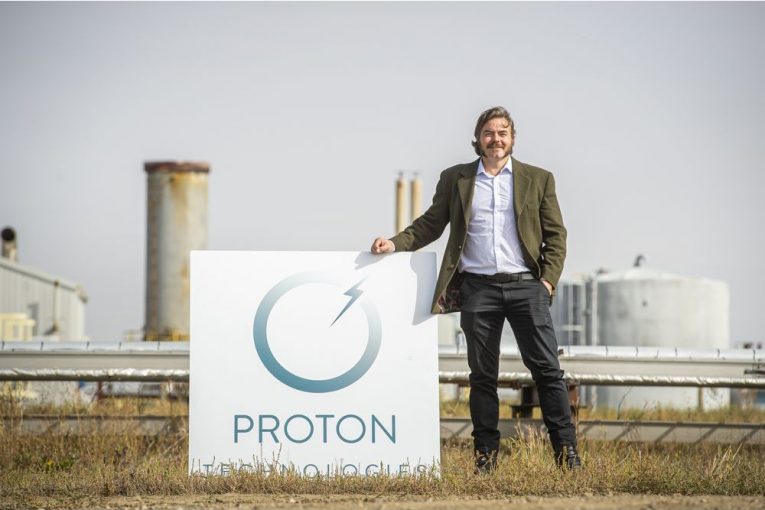
Many depleted oilfields were shut down because all of the easy oil had been extracted. Companies see them as a cleanup problem, but chair and CEO Grant Strem and his team at Proton Technologies see them as a harvest of hydrogen gas that offers a huge opportunity to produce a clean, low-cost energy.
Using its game-changing technology, his company has found a way to leave harmful emissions and carbon in the ground and extract only pure hydrogen. Pure oxygen is injected into the ground to induce a series of reactions that heats up the oil and releases hydrogen. By using a palladium-alloy membrane, only hydrogen can get through, and it is pulled to the surface leaving everything else in the ground.
Strem says it’s actually an old process that has been used to heat underground oil to make it flow better, but operators didn’t notice or didn’t care about the hydrogen in their haste to fill barrels.
He compares his technology to people lugging around heavy suitcases for years, despite the fact that wheels had been invented centuries before. It just required someone to think about a simple solution. Extracting low-cost hydrogen from oilfields is not complex — it just hadn’t been done before.
Obviously, the new technology to leave other emissions in the ground and extract only pure hydrogen has taken years of research that Strem and his team have worked hard to develop into an alternative form of energy.
Earning degrees at the University of Calgary’s Schulich School of Engineering, including an M.Sc. in geology and geophysics with a specialization in reservoir characterization, he bonded with his professor, Ian Gates, and together they recognized that a hydrogen economy is the eventual zenith of the world’s energy continuum.
Gates is still actively involved as an adviser to Proton, which was co-founded in 2015 by Strem and Jacky Wang. In 2017, the company bought the aging Kerrobert heavy oil field in Saskatchewan. Still producing, while it paid the bills it was also used as a pilot in injecting oxygen into its reservoir.
Results confirm that Proton is able to produce hydrogen at a cost far below existing market prices, without releasing any greenhouse gases into the atmosphere.
Initially, the hydrogen will be transported to Proton’s customers by truck. As more is produced, the company plans to blend the hydrogen into natural gas pipelines, making it easier to use for heating homes or for power generation.
Strem says that long term, hydrogen will not be limited only to uses such as feedstock for the chemical industry or upgrading oil, but it will be used effectively and cheaply for powering vehicles — low-cost hydrogen can fuel a 900-horsepower truck for only a few dollars — heating fuel and many other uses currently relying on hydrocarbons.
Today, a primary market is baseload power — making electricity and selling it through existing infrastructure to an existing market; a contract has already been approved for a 20-year power purchase by SaskPower to buy electricity via hydrogen-compatible generators.
Commercialization of Proton’s hydrogen is well underway and the company has secured licence agreements with companies in 11 countries.
Proton’s mission is to transform the deep earth into a continuing source of green energy, and help usher in a new era for cities and industry worldwide.
Energy costs can drop as hydrogen can be produced at a fraction of the cost of diesel and gasoline, and mature oilfields now have new value.
Hopefully, Proton will receive robust funding for a fast build-out and proliferation to achieve its target of producing hydrogen at a large scale as a way of decarbonizing energy.
Notes:
Calgary-based TransRail Innovation Group is bringing new innovation to Canada’s rail industry with the acquisition of Formation Liquids Logistics Ltd. “Bringing FLLL into the TRIG fold allows us to bring new technology and best practices to rail terminals and shippers,” says Rob Tasker, CEO of TRIG. “Given recent announcements on pipelines, this is an important time to improve safety and efficiency of rail operations for transporting petroleum products.” Marvin Trimble, co-founder of FLLL, joins TRIG as vice-president of rail technology and improvement.
David Parker appears regularly in the Herald. Read his columns online at calgaryherald.com/business. He can be reached at 403-830-4622 or by email at
.ca
.
You can read more of the news on source
